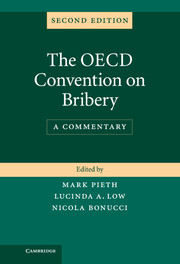Book contents
- Frontmatter
- Contents
- Notes on Contributors
- Foreword
- Acknowledgements
- Abbreviations
- Part I Introduction
- Part II Commentary
- Article 1 The Offence of Bribery of Foreign Public Officials
- Article 2 The Responsibility of Legal Persons
- Article 3 Sanctions
- Article 3(3) Seizure and Confiscation
- Article 4 Jurisdiction
- Article 5 Enforcement
- Article 6 Statute of Limitations
- Article 7 Money Laundering
- Article 8 Accounting
- Articles 9–11 International Co-operation
- Article 12 Monitoring and Follow-up
- Articles 13–17 Final Provisions
- Part III The Convention in Practice
- Annex OECD Documents
- Consolidated Bibliography
- Index
- References
Article 5 - Enforcement
from Part II - Commentary
Published online by Cambridge University Press: 05 March 2015
- Frontmatter
- Contents
- Notes on Contributors
- Foreword
- Acknowledgements
- Abbreviations
- Part I Introduction
- Part II Commentary
- Article 1 The Offence of Bribery of Foreign Public Officials
- Article 2 The Responsibility of Legal Persons
- Article 3 Sanctions
- Article 3(3) Seizure and Confiscation
- Article 4 Jurisdiction
- Article 5 Enforcement
- Article 6 Statute of Limitations
- Article 7 Money Laundering
- Article 8 Accounting
- Articles 9–11 International Co-operation
- Article 12 Monitoring and Follow-up
- Articles 13–17 Final Provisions
- Part III The Convention in Practice
- Annex OECD Documents
- Consolidated Bibliography
- Index
- References
Summary
Enforcement
Investigation and prosecution of the bribery of a foreign public official shall be subject to the applicable rules and principles of each Party. They shall not be influenced by considerations of national economic interest, the potential effect upon relations with another State or the identity of the natural or legal persons involved.
Official Commentaries
Article 5 – Enforcement
Article 5 recognises the fundamental nature of national regimes of prosecutorial discretion. It recognises as well that, in order to protect the independence of prosecution, such discretion is to be exercised on the basis of professional motives and is not to be subject to improper influence by concerns of a political nature. Article 5 is complemented by paragraph 6 of the Annex to the 1997 OECD Revised Recommendation on Combating Bribery in International Business Transactions, C(97)123/FINAL (hereinafter, ‘1997 OECD Recommendation’), which recommends, inter alia, that complaints of bribery of foreign public officials should be seriously investigated by competent authorities and that adequate resources should be provided by national governments to permit effective prosecution of such bribery. Parties will have accepted this Recommendation, including its monitoring and follow-up arrangements.
- Type
- Chapter
- Information
- The OECD Convention on BriberyA Commentary, pp. 349 - 396Publisher: Cambridge University PressPrint publication year: 2013

